| Srl | Item |
| 1 |
ID:
119284
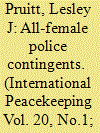

|
|
|
|
|
| Publication |
2013.
|
| Summary/Abstract |
This article focuses on women's involvement in peacekeeping operations and the introduction in 2007 of an all-female formed police unit (FFPU). Possible benefits and challenges of deploying all-female contingents in peace operations are considered and feminist theories of international relations are drawn upon to evaluate arguments for including women in peace and security missions. Media discourses on the Indian FFPU deployed to Liberia in 2007 are analysed, revealing a potential to reshape attitudes about the role of women in peace and security, and emphasizing that femininity need not be incompatible with strength and capacity for protection.
|
|
|
|
|
|
|
|
|
|
|
|
|
|
|
|
| 2 |
ID:
119280
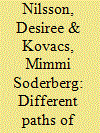

|
|
|
|
|
| Publication |
2013.
|
| Summary/Abstract |
Security Sector Reform (SSR) has developed into a key component of international peacebuilding agendas. However, there is a lack of sufficient knowledge of the advantages and drawbacks of different reform processes. This study offers a comparative analysis of two post-war states with diverse approaches to the reconstruction of the national armed forces after a civil war: Sierra Leone after the 1999 Lomé Peace Accord, where the competing warring parties were integrated into a single force; and Liberia following the 2003 Accra Peace Agreement, where the old army was disbanded and a new force was recruited and built from scratch. The findings show that each approach was associated with distinct benefits and risks during the implementation process. However, the outcomes are also similar in many important respects, and raise questions about the long-term sustainability of these reforms.
|
|
|
|
|
|
|
|
|
|
|
|
|
|
|
|
| 3 |
ID:
119286
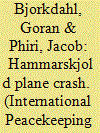

|
|
|
|
|
| Publication |
2013.
|
| Summary/Abstract |
Dag Hammarskjöld died in a plane crash on 17 September 1961 on route to Ndola, Zambia, to negotiate an end to fighting between UN troops and the break-away Katanga army. The Rhodesian-led inquiry commission in 1961-62 concluded that a pilot error caused the crash while the UN commission in 1962 was inconclusive. These commissions neglected to actively search for Zambian witnesses of black African origin and neglected the testimonies from those that were heard. A systematic search during 2007-12 identified ten previously unknown Zambian eye witnesses whose testimonies provide sufficient new information to justify a new UN inquiry into the cause of the crash.
|
|
|
|
|
|
|
|
|
|
|
|
|
|
|
|
| 4 |
ID:
119282
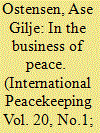

|
|
|
|
|
| Publication |
2013.
|
| Summary/Abstract |
Private military and security companies increasingly perform services for the UN. The article describes how these companies are used by the UN organization and become part of UN operations. Their participation influences the planning and implementation of UN peacekeeping. By performing tasks such as protective security, security training, peacekeeper training, counselling and intelligence, private companies influence both the epistemological and operational dynamics of peacekeeping. This not only diffuses authority over peacekeeping into the commercial market, it often happens with a very low degree of transparency.
|
|
|
|
|
|
|
|
|
|
|
|
|
|
|
|
| 5 |
ID:
119283


|
|
|
|
|
| Publication |
2013.
|
| Summary/Abstract |
This article offers a first-hand account of a grassroots peace initiative that appeared in war-affected areas of Nicaragua in the 1980s and still exists to date. While bottom-up initiatives usually hardly scale up, the Nicaraguan peace commissions managed to convert into a broad peace infrastructure, weaving horizontal and vertical relationships with a variety of actors with the assistance of external organizations. They adapted their work to the evolving socio-political context, beginning with immediate concerns during the armed conflict, such as mediating between warring parties to protect civilians, and progressively addressing a broader range of conflicts. While this adaptive capacity could explain their endurance, the sustainability of their peacebuilding endeavours matters most. By establishing local capacities for peace throughout society, the peace commissions laid the ground for these peacebuilding endeavours to last.
|
|
|
|
|
|
|
|
|
|
|
|
|
|
|
|
| 6 |
ID:
119285


|
|
|
|
|
| Publication |
2013.
|
| Summary/Abstract |
The purpose of this article is to outline developments in UN training programmes in negotiation, and civil military coordination. The article seeks to engage positively with critical assessments of peacekeeping and peacebuilding. It demonstrates that by making military peacekeepers aware of non-violent solutions to potentially violent situations (through negotiation skills for instance), and also of the peacekeeping/peacebuilding nexus (for example through civil-military coordination), there are signs of a deepening understanding of principles of conflict resolution by those who run UN peacekeeping structures.
|
|
|
|
|
|
|
|
|
|
|
|
|
|
|
|
| 7 |
ID:
119281
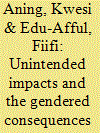

|
|
|
|
|
| Publication |
2013.
|
| Summary/Abstract |
Despite increased international attention to managing the potential impacts of peacekeeping on host countries, unintended consequences continue to emerge. This article focuses particularly on the alternative economies that peacekeeping operations generate and the differential economic impacts on individuals who come into contact with peacekeepers. Based on empirical evidence derived from fieldwork in Liberia, the article highlights the everyday lives of women whose livelihoods have been affected by the presence of peacekeeping missions. It also discusses how such economies adjust during the peacekeeping drawdown phase, and explores the dynamics that such economies have on specific segments of the Liberian population. The argument is that, while peacekeeping economies are critical in stimulating the local economy and providing livelihoods during and in the immediate aftermath of war, they have negative unintended impacts that need mitigation.
|
|
|
|
|
|
|
|
|
|
|
|
|
|
|
|